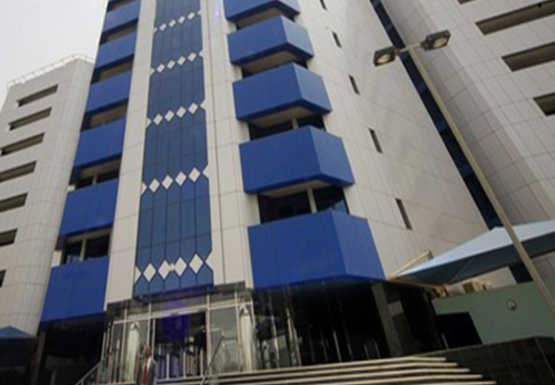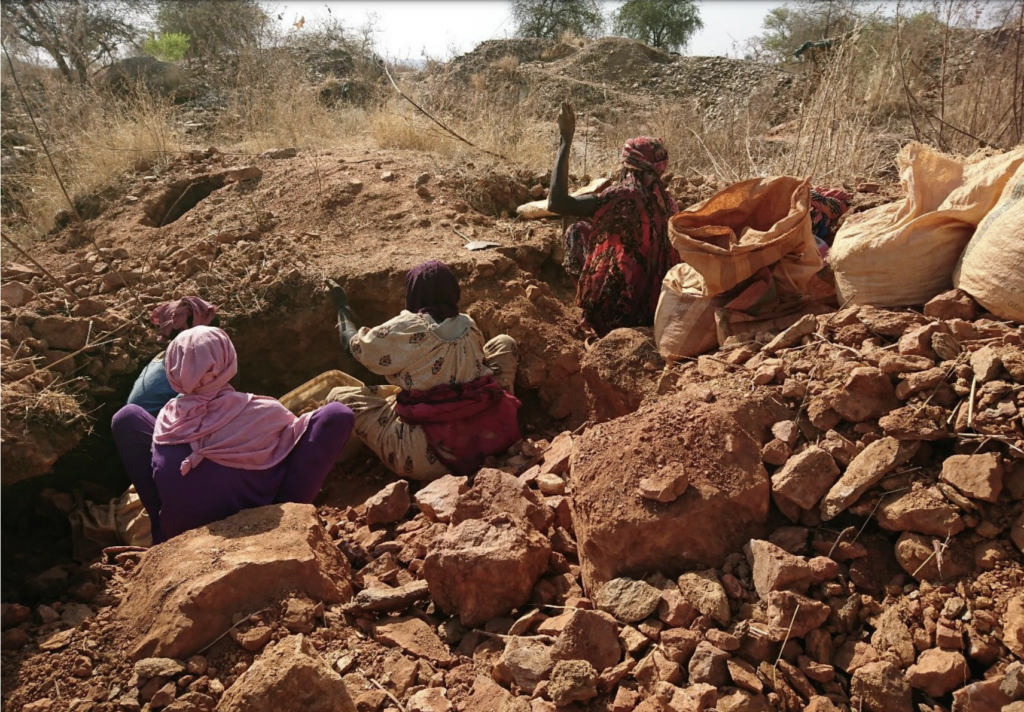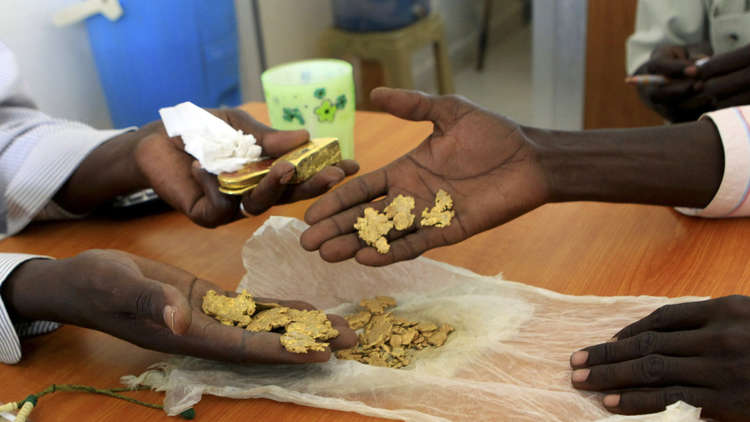Conflicts of influence and interests confound Central Bank of Sudan

The Central Bank of Sudan in Khartoum (File photo: CBoS)
Report by Suleiman Siri
The Central Bank of Sudan (CBS) has witnessed a state of political and economic influence struggles with the owners of gold exporting companies on the one hand and some influential leaders in the country on the other hand, in an attempt by the Central Bank of Sudan to implement its decisions to prohibit the purchase and export of gold by companies or from the production of private mining, and to limit its purchase to the Central Bank or its delegates, while its export is limited to the bank only.
However, the decision did not satisfy the owners of companies and some influential people in the state, which weakened the position of the Central Bank, as a sudden decision was issued by the head of the Sovereignty Council, Abdel Fattah al-Burhan, to dismiss the governor of the Central Bank of Sudan, Burai Al-Siddiq Ali Ahmed, following a stormy meeting held recently with representatives of companies and in the presence of the Minister of Finance.
Amna Mirghani Hassan El Toum was appointed as his successor, as the first Sudanese woman to hold the position. Less than two weeks later, the second decision to dismiss the bank’s second man, Central Bank of Sudan Deputy Governor Mohamed Osman Ahmed Mohamed Khair, was issued on Friday.
The successive dismissal decisions have sparked controversy about what is going on inside the Central Bank of Sudan and why the pace of conflicts has escalated rapidly to reach the stage of settling accounts with the removal of senior leaders within the bank. What are the real reasons behind the frequent changes in the central bank’s leadership?
Banking expert Omar Sayed Ahmed said in an interview with Radio Dabanga that the frequency of dismissals and appointments at the Bank of Sudan reflects what he described as the politicization of the monetary decision and the lack of institutional independence of the Central Bank for decades, pointing out that successive governments have been viewing it as a ‘financing arm’ for fiscal policies, rather than an independent monetary authority, “which has made the position subject to change whenever the balance of power changes or a political dispute breaks out”.
He added that this approach has led to the erosion of institutional credibility and the loss of continuity in monetary policies, and the governor has become replaced with every political dispute or change in the balance of power within the country and the conflict of interests over gold.

Intertwined interests
He pointed to one of the most prominent manifestations of the conflict represented in the intertwined interests over the gold file, where gold has become the main source of foreign exchange for years and has become more than 60 per cent of the export earnings, which has led to the emergence of networks with multiple interests, both official and informal, competing for control of pricing, exports, and revenues.
Sayed Ahmed, who served as the general manager of several banks, the latest of which was the Export Development Bank, explained that the previous governor’s decision in mid-2024 to limit the export of gold through the Central Bank faced fierce resistance from the parties benefiting from smuggling and price differences.
The decision turned from an economic measure into a power battle between the central bank, gold traders, and influential institutions, and that confrontation ended with the dismissal of the governor last October.
The expert also expressed his belief that among the fundamental reasons is the absence of a legal framework that guarantees the independence of the Central Bank, as the current law does not clearly define the conditions for the dismissal of the governor or the duration of his term, which makes him vulnerable to dismissal by an administrative decision without accountability or justification.
He stressed that this legal vacuum weakened the bank’s institutional independence and made the position a tool in political and economic conflicts, especially after the coup and the ongoing war.
He stressed that one of the most prominent aspects of the crisis is the lack of transparency in the gold export file, as there is no unified official platform to document the data of gold production and export, and each entity, whether a bank, an official agency or a mining company, has its own numbers. This creates deliberate ambiguity and weakens public accountability. It opens the door to power struggles over who owns the information and who controls the price, pointing out that all indicators, figures, and sources talk about between 50 and 80 per cent of the gold produced being smuggled.

Central Bank credibility
Regarding the impact of the decisions to change portfolios on the banking system, investors and the credibility of the bank, Sayed Ahmed expressed his belief that changing portfolios every two years or less makes the Central Bank lose its institutional memory and make every short-lived policy and decisions change before their results are achieved, causing permanent regulatory turmoil within the banking sector.
He said foreign banks and financial reporters monitor the stability of the leadership before expanding credit limits or opening new accounts, and when dismissals are repeated, Sudan is listed among high-risk countries, the cost of foreign remittances is raised, and correspondents’ accounts are frozen “if they exist at all”.
He added that local and foreign investors are losing confidence in the stability of monetary regulations and policies, investment flows are declining, and reconstruction programs are halted, while local banks are suffering from repeated changes in financing and reserve instructions, which confuse their management and weaken their operational stability.
In his assessment of the decision to limit the export of gold through the Central Bank, Sayed Ahmed said that the decision in terms of intention was aimed at controlling the proceeds, restricting smuggling and restoring control over foreign exchange resources, but it was slowed down in terms of implementation by transforming the Central Bank from a supervisory body to an operational entity, which created a conflict of interest and weakened its role as a market regulator.
He added that the theoretical advantages of the decision — such as standardization of the official outlet, reduced leakage and ensuring the entry of export proceeds — but considered that the practical disadvantages were greater due to the lack of commercial efficiency, poor pricing, and negative signals to investors.
Alternative regulated market for gold
Banking expert Omar Sayed Ahmed explained that the most appropriate alternative to address the crisis is the establishment of a regulated market for gold through a national exchange linked to a neutral refinery and an official trading platform ‘electronic auction’, with the licensing of qualified issuers according to compliance and transparency standards, and ensuring the return of the proceeds of exports through the banking system, to achieve an economic model that balances transparency and openness without monopoly or restriction.
Sayed Ahmed pointed out that what is required for the stability of the leadership and monetary policies is an urgent amendment to the Bank of Sudan Law so that the term of office of the governor is set at six non-renewable years, and that he should not be dismissed except for clear and declared legal reasons.
He also called for the establishment of a monetary policy board that includes independent experts, and the publication of brief statements after each meeting, with a complete separation between the supervisory role of the central bank and the commercial role of other executives.

He stressed the importance of strengthening internal audit and appointing an independent external auditor and limiting the term of the parliamentarians’ term to four years, renewable once, with their overlapping tenures to ensure institutional continuity.
It also recommended the publication of monthly reports on gold production and export earnings, the establishment of a unified electronic platform for transparency, and the issuance of a package of stability decisions within 12 months after the cessation of the war.
These include an urgent amendment to the Central Bank of Sudan Law, a written institutional agreement between the Bank of Sudan and the Ministry of Finance to regulate the management of export earnings, a government pledge not to interfere in monetary policies, in addition to updating the banking compliance system with ‘Know Your Customer’ requirements, the Anti-Terrorism and Money Laundering Law, and the activation of the Institutional Outreach Program that issues inflation and exchange rate reports periodically.
Structural crisis
Financial and banking expert Omar Sayed Ahmed concluded that the dismissal of the Central Bank Governor in October 2025 was not a passing event, but a reflection of a structural crisis in the independence of the Central Bank, pointing out that the large number of dismissals makes the banking system work without a clear compass, and Sudan loses the confidence of investors and financial reporters abroad.
He stressed that the only way to reform is to consolidate the institutional and legal independence of the central bank, and to separate monetary policy from trade conflicts, while adopting the regulated market model for gold so that the central bank can return to its natural position as a guardian of financial stability.











 and then
and then